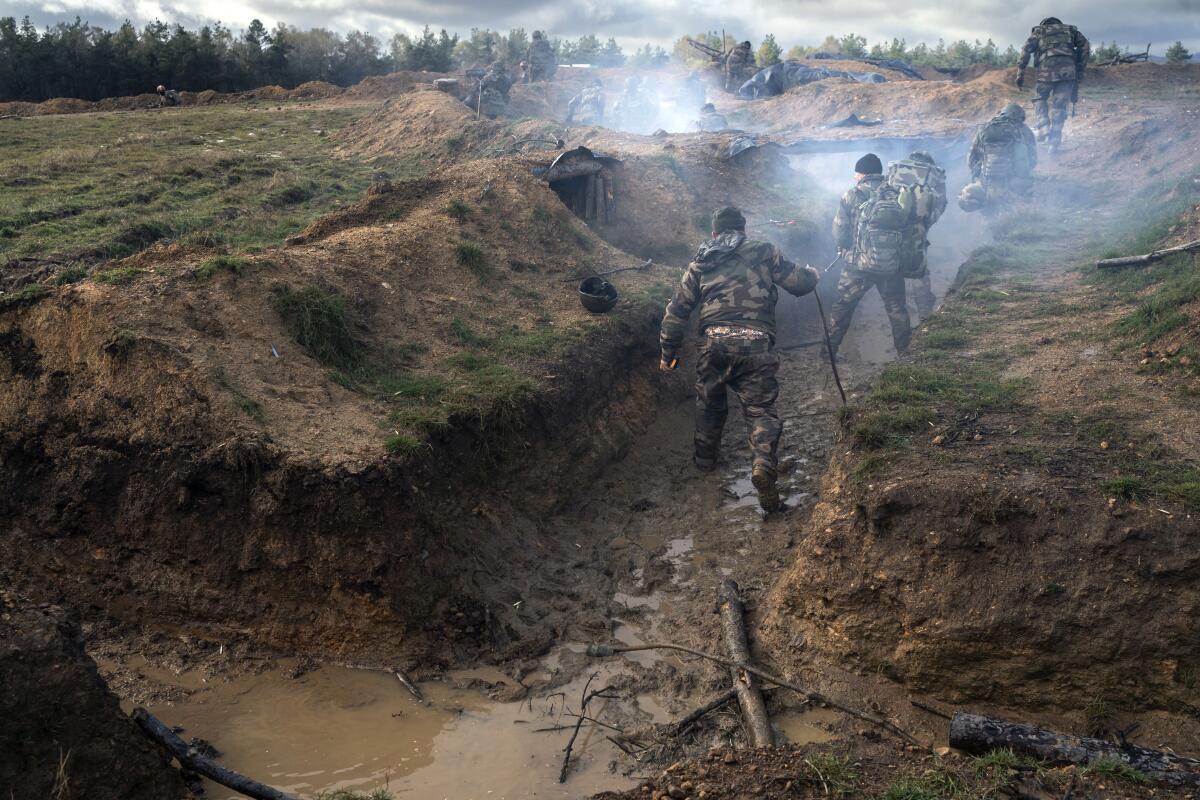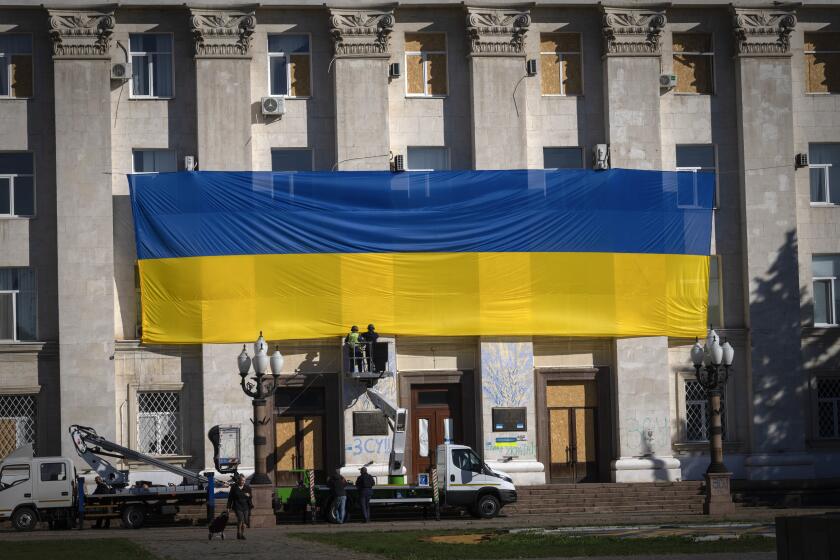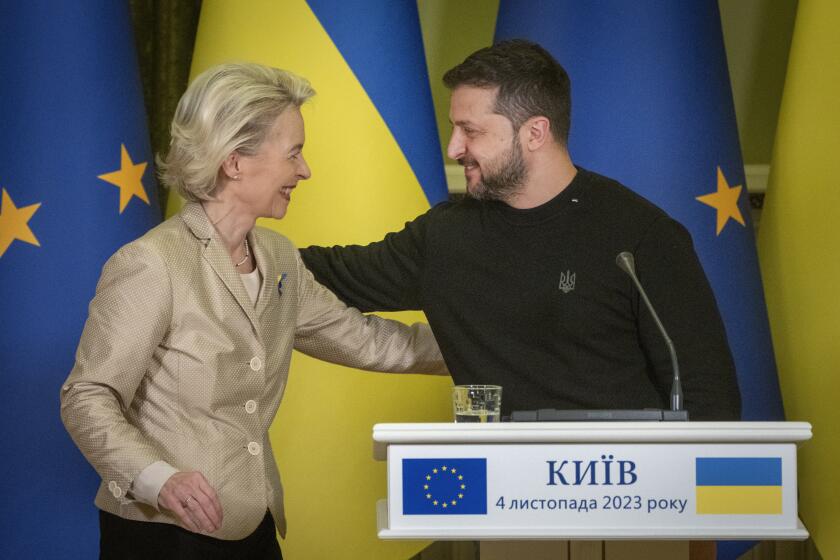Military training efforts for Ukraine hit major milestones even as attention shifts to Gaza

- Share via
A FRENCH ARMY BASE, France — Battle cries pierce the smoke and rat-a-tat-tat of gunfire as Ukrainian soldiers fight through and take enemy trenches and dugouts that hide gruesome, bloody remains.
“Grenade!” one soldier screams in Ukrainian. Another yells: “Let’s go, let’s go, let’s go, let’s go!”
This time, no lives or limbs were lost. The rounds fired were blanks, and the “enemy” troops were, in fact, French soldiers whose intention was not to kill the Ukrainians but instead to help shape them into better, more lethal warriors.
But soon, the war games these troops played in the mud in France will become all too real, when the Ukrainians return home and are sent to the front lines against Russia’s forces.
As the Russian invasion grinds into a second winter and casualties — already estimated in the hundreds of thousands — continue to mount on both sides, combat training programs provided by Ukraine’s allies are helping it hold out and improving its odds of eventual victory. By continuing to prepare Ukrainian troops for battle even as the Israel-Hamas war diverts global attention, Ukraine’s backers also are making concrete their promises to stick with it for the long haul.
France is on course to have trained 7,000 Ukrainians this year — some in Poland, others at French bases — as part of a European Union military assistance mission for Ukraine that launched a year ago this week. The French army granted the Associated Press access to a training base in rural France last week to observe the latest class of Ukrainian infantrymen being put through their paces at the tail end of a four-week course.
One year since Ukraine retook the city of Kherson from occupying Russian forces, residents have grown accustomed to the sounds of the bombs reminding them that the war is far from over.
The EU mission’s initial goal was to train 15,000 soldiers, but it has far exceeded that target and now expects to hit 35,000 by the end of this year. All but three of the EU’s 27 member countries, plus non-member Norway, have provided training courses or instructors, the EU Commission says.
The United States has trained about 18,000, mostly in Germany, with an additional 1,000 in the pipeline, the Pentagon says.
In Britain, 30,000 have learned soldiering in the last 17 months, a training program the British government says is unprecedented since World War II.
As well as basic training with weapons, battlefield first aid and other skills, instructors are also imparting specialized military know-how, including mine clearance, launching waterborne attacks aboard small boats, equipment repair, officer training and even help for Ukrainian military chaplains.
Ukraine, Moldova and Georgia receive positive news about their quests to join the European Union, but hopeful Balkan countries appeared to slip back.
With their return to Ukraine just days away, the grimness of the future that awaits the trainees at the French base was perceptible in the men’s determined, unsmiling looks. Civilians not long ago, they now carried themselves like soldiers. They addressed each other with nicknames. There was liberal swearing as the men caught their breaths after storming trenches with fake grenades and blank rounds.
French instructors left animal remains in the complex of dugouts and ditches to harden the troops to battlefield bloodshed. Only the officers had previous front-line experience, the chief French training officer said.
He said Ukraine was looking to France for tactics and know-how that could help its forces bust through Russian defenses. Because of French military concerns for the base’s security, the officer, Lt. Col. Even, can be identified only by his rank and first name.
“One can clearly see in Ukraine that the front line is relatively frozen, with two belligerents who employ very similar doctrines,” he said. “So today, one of the keys being sought in an attempt to break this inertia is to try to develop maneuvering schemes that can bother and even shake up the adversary.”
NATO allies have suspended participation in a key Cold War-era security treaty on forces in Europe in response to Russia’s withdrawal from the pact.
As well as seeing their assault on freshly dug trenches, the AP observed Ukrainians vigorously defending a mock-up village against a French “enemy” attack and concealing themselves in rain-drenched woodlands. Translators bridged the language gap between the soldiers and their French hosts.
French trainers said they’ve learned through experience that it’s unwise to get too friendly with the trainees — because some of them are sure to be killed back home. After sharing the bonding discomforts of long days and nights in the French wilds, they sever ties when the training is done, with soldiers under orders not to swap phone numbers or other contacts.
“You have to burn bridges because otherwise you ask yourselves too many questions. When you find out that this or that person is dead, you’re bound to ask yourself what you did wrong: ‘Did we work enough on this or that tactic? Should I have insisted more on this point?’” said one of the instructors, Capt. Xavier.
“We’re doing our utmost,” he said. “Asking yourself afterward what you did wrong or could have done better is torturing yourself for nothing.”
More to Read
Sign up for Essential California
The most important California stories and recommendations in your inbox every morning.
You may occasionally receive promotional content from the Los Angeles Times.













